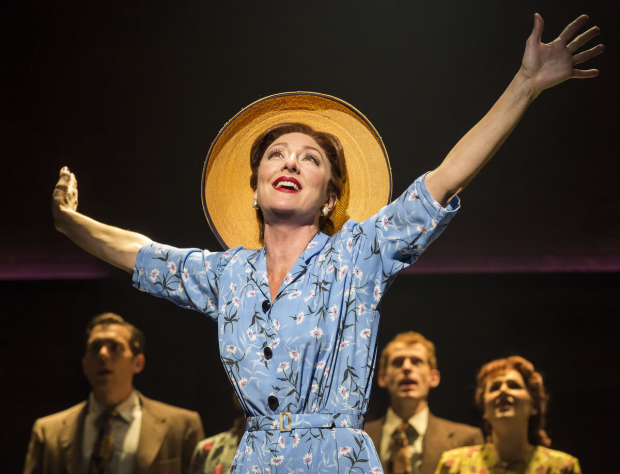
(© Craig Schwartz)
Bright Star has so many winning attributes that one can easily forget its shortcomings and simply enjoy the experience. The music by Steve Martin and Edie Brickell employs a lilting bluegrass sound, Walter Bobbie's direction is stellar, and Carmen Cusack gives a performance you will remember for years to come.
Just after WWII, a young soldier, Billy (A.J. Shively), travels to the big city of Asheville, North Carolina, to pitch his stories to Alice Murphy (Cusack), the prestigious editor of the Asheville Southern Journal. Alice has become a hard woman after suffering great losses. The play jumps between both Billy's burgeoning writing career in 1945 and Alice's youth in 1923 and her romance with a boy from the better side of the tracks (Patrick Cummings), offering audiences a glimpse into what made Alice lose her innocence so painfully.
Martin and Brickell turn bluegrass into a musical representation of a beating heart. The melodies range from driven to gentle, tender, and steady. Sadly, the lyrics by Brickell are not up to the music's level. They awkwardly repeat passages and lack nuance, revealing nothing about the characters that hasn't been stated already in the dialogue. Martin and Brickell's book is clever and warm, with funny lines that manage to take a story line that could have been lifted from a Lifetime movie and make the audience invested in the characters.
The one false note is that the ending belongs in a frothy Cole Porter screwball comedy. It clashes with the realistic tone the musical has built up to that point. Martin and Brickell also can't seem to decide who the protagonist is. Several character motivations only complicate matters, including Billy's relationship with his childhood crush Margo (Maddie Shea Baldwin), which is quaint but superfluous. Ending Act 1 with the villain singing a trite justification song loses the audience when you need them to hang on the most.
Walter Bobbie's graceful direction is threaded through every movement in the show, with the ensemble flowing around the stage moving sets, and helping cast members change costumes flawlessly. Bobbie's movements flow into Josh Rhodes's choreography. The pair subtly create tableaus, positioning the actors as if they were composition elements. One particularly beautifully staged moment comes when the ensemble acts as Margo's conscience during the clever "Asheville" number, where two members both hold back and sweep Billy away from Margo as she debates proclaiming her love for him.
Cusack is electric as Alice. Her exquisite voice enhances the melodies, and her performance, poised and bottled-up at times and vulnerable at others, turns Alice into a heroine over which audiences swoon. Shively is naively appealing as the soldier. Cummings turns Alice's beau into an idealistic and sexy lover. Though the character is an unnecessary diversion to the plot, Baldwin is darling as the youthful Margo. Rounding out the supporting cast, Jeff Blumenkrantz and Kaitlyn Davidson receive the best jokes and know how to make them land.
Designer Edward Pierce's wooden shack sets the bucolic tone of a southern mountain town, while also housing the small onstage band. Japhy Weideman's refreshing lighting resembles the sunlight breaking through the trees.
Bright Star takes a cliché story line and invigorates it with unique music, solid staging, and a soulful performance by Carmen Cusack. Had more kinks been worked out before it launched on Broadway, it might have been the brightest star of the season.









